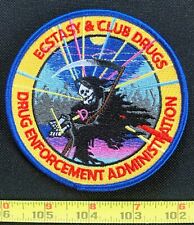
Prior studies that identified cognitive impairment in ecstasy (3,4-Methylenedioxymethamphetamine) users were flawed, say the researchers behind a new study that indicates ecstasy users show no signs of cognitive impairment attributable to drug use. The new study, appearing in the journal Addiction, also claims that earlier research overstated the cognitive differences between ecstasy users and non-users. Ecstasy is a popular illicit drug and it is believed that it has been used by 12 million people in the United States.
The new study was specifically designed to minimize the methodological limitations of earlier research, according to lead author John Halpern. “Researchers have known for a long time that earlier studies of ecstasy use had problems that later studies should try to correct. When NIDA [National Institute on Drug Abuse] decided to fund this project, we saw an opportunity to design a better experiment and advance our knowledge of this drug,” he said.
Halpern claims to have fixed four problems identified in earlier research on ecstasy.
- Ensuring that non-users in the experiment were members of the “rave” subculture and thus repeatedly exposed to sleep and fluid deprivation from all-night dancing (factors that themselves can produce long-lasting cognitive effects).
- Participants were screened for drug and alcohol use on the day of cognitive testing, to make sure all participants were tested while clean.
- Halpern chose ecstasy users who did not habitually use other drugs that might themselves contribute to cognitive impairment.
- He also corrected for the possibility that any cognitive impairment shown by ecstasy users might have been in place before they started using the drug.
But Halpern doesn’t want to give the drug the thumbs-up. “Ecstasy consumption is dangerous: illegally-made pills can contain harmful contaminants, there are no warning labels, there is no medical supervision… while we found no ominous, concerning risks to cognitive performance, that is quite different from concluding that ecstasy use is ‘risk-free,'” he concluded.
Related:
Ecstasy’s empathogenic properties revealed to be a sham
Disco Rats Last Longer On Ecstasy


















Comments are closed.